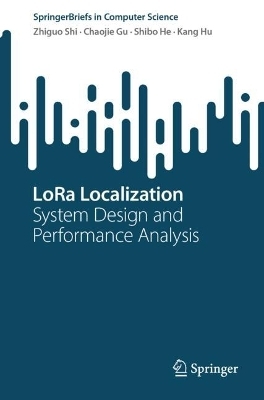
LoRa Localization
Springer International Publishing (Verlag)
978-3-031-48010-2 (ISBN)
This book delves deep into the world of low-power Internet of Things (IoT) node positioning, in an era where IoT is revolutionizing connectivity and communication. It focuses on the critical aspect of accurate node positioning, which has transformative potential across various industrial applications. Specifically, this book explores how LoRa (Long Range) technology, known for its long-range wireless capabilities, low power consumption and cost-effectiveness. It can be harnessed to achieve precise and efficient node localization in both indoor and outdoor environments.
In Chapter 1, readers are introduced to the landscape of low-power IoT, providing background information, discussing network architecture and exploring the research landscape surrounding node positioning. Chapter 2 presents a modular hardware platform tailored for IoT applications and delves into wireless positioning techniques. Chapter 3 takes readers on a journey through wide area location using signal flight time and optimization techniques, emphasizing high accuracy, while keeping power consumption low. Chapter 4 showcases a cost-effective LoRa Mesh networking-based positioning system with wide-area coverage capabilities. This book continues by addressing the intricacies of indoor positioning challenges in Chapter 5, leveraging signal arrival angles and antenna array structures for precise localization. Chapter 6 explores fusion localization and tracking through mobile robots, enhancing position estimation and trajectory tracking in diverse environments. Finally, Chapter 7 offers a comprehensive conclusion, summarizing key insights and proposing future research directions in LoRa's fusion positioning for both indoor and outdoor scenarios.
This book is designed for researchers, engineers, and practitioners keen on unlocking the potential of low-power IoT node positioning and contributing to the advancement of IoT technologies. Advanced level students in computer science and electrical engineering interested in this topic will find this book useful as well.Zhiguo Shi received the B.S. and Ph.D. degrees in electronic engineering from Zhejiang University, Hangzhou, China, in 2001 and 2006, respectively. Since 2006, he has been a faculty member with the College of Information Science and Electronic Engineering, Zhejiang University, where he is currently a full professor. From 2011 to 2013, he was visiting the Broadband Communications Research Group, University of Waterloo, Waterloo, ON, Canada. His current research interests include array signal processing, target tracking and positioning, IoT system design, and anti-drone system technic and system. He has more than 100 issued patents. He is serving/served as an AE of IEEE Signal Processing Letters, IEEE Transactions on Vehicular Technology, IEEE Network, IET Communications, and Journal of The Franklin Institute. He served as the general co-chair of IEEE SAM 2020, and will serve as the TPC co-chair of IEEE/CIC ICCC 2024
Chaojie Gu received the B.Eng.degree from Harbin Institute of Technology, China, in 2016, and the Ph.D. degree in computer science and engineering from Nanyang Technological University, Singapore, in 2020. He was a Research Fellow with Singtel Cognitive and Artificial Intelligence Lab for Enterprise (SCALE) in 2021. He is an Assistant Professor with the College of Control Science and Engineering, Zhejiang University, Hangzhou, China. His research interests include IoT, industrial IoT, edge computing, and low power wide area network.
Shibo He received the Ph.D. degree in control science and engineering from Zhejiang University, Hangzhou, China, in 2012. He is currently a Professor with Zhejiang University. He was an Associate Research Scientist in 2014 for two months and a Post-Doctoral Scholar from 2012 to 2014 with Arizona State University, Tempe, AZ, USA. From 2010 to 2011, he was a Visiting Scholar with the University of Waterloo, Waterloo, ON, Canada. His current researchinterests include wireless sensor networks, crowdsensing, and big data analysis. Dr. He serves on the Editorial Board of the IEEE Transactions on Vehicular Technology, Springer's Peer-to-Peer Networking and Application and KSII Transactions on Internet and Information Systems. He has been a Guest Editor of Elsevier's Computer Communications and Hinda WI's International Journal of Distributed Sensor Networks.
Kang Hu received the B.Sc. degree from the School of Mechanical Engineering and Electronic Information, China University of Geosciences, Wuhan, China, in 2017, and the Ph.D. degree from Zhejiang University, Hangzhou, China, in 2022. He is currently working for the IoT department of Alibaba. His research interests include low-power wide-area networks and localization.
1 Introduction.- 1.1 Background .- 1.1.1 Internet of Things (IoT).- 1.1.2 Low Power Wide Area Network (LPWAN).- 1.1.3 Location-based Internet of Things Services and Industrial Applications.- 1.2 Current Situation and Challenge.- 1.2.1 Challenges and Contributions.- 1.3 Book Organization.- References .- 2 Wireless Localization Model and Hardware Foundation.- 2.1 LoRa and its Ranging Engine.- 2.1.1 LoRa Network Structure.- 2.1.2 LoRa Nodes Distance Estimation.- 2.1.3 LoRa Nodes Angle Estimation.- 2.2 Angle of Arrival (AoA) Estimation.- 2.3 Hardware.- 2.3.1 Hardware Platform Design.- 2.3.2 Heterogeneous Devices and Protocol Interface Design.- References.- 3 LoRa-based Mobile Localization System.- 3.1 System Model.- 3.1.1 System Overview.- 3.1.2 Localization Model.- 3.2 Distance and Location Estimation.- 3.2.1 Distance Estimation.- 3.2.2 Anchor Location Estimation.- 3.3 Localization Optimization.- 3.4 Implementation and Evaluation.- 3.4.1 System Implementation.- 3.4.2 Localization Simulations.- 3.4.3 System Evaluation.- 3.5 Summary.- References.- 4 Wide-Area Localization System Based on LoRa Mesh.- 4.1 Hardware Design.- 4.2 LoRa Mesh Protocol Design.- 4.2.1 The Structure of the Mesh Protocol.- 4.2.2 Route Discovery and Maintenance.- 4.2.3 Routing Algorithm .- 4.3 LoRa Ranging and Localization .- 4.3.1 Localization Workflow.- 4.3.2 Ranging Algorithm.- 4.3.3 Localization Algorithm.- 4.4 Implementation.- 4.4.1 Control and Visualization Interface.- 4.4.2 Anchors Deployment .- 4.5 Evaluation.- 4.5.1 Ranging Experiment .- 4.5.2 Positioning Experiment.- 4.6 Summary.- References.- 5 Enable Angle of Arrival in LoRa for Efficient Indoor Localization.- 5.1 Problem formulation and Challenges.- 5.2 Redesign of LoRa Gateway and Ranging Procedure.- 5.2.1 Gateway Redesign.- 5.2.2 Leveraging Ranging Difference.- 5.2.3 Ranging Procedure Redesign.- 5.3 Improving AoA Estimation via Rotation.- 5.3.1 Binary AoA Classification.- 5.3.2 Virtual Array.- 5.3.3 AoA Calculation.- 5.4 Implementation and Applications.- 5.4.1 Implementation.- 5.4.2 Applications.- 5.5 Performance Evaluation.- 5.5.1 Ranging Difference Estimation .- 5.5.2 AoA Estimation.- 5.5.3 NLoS Localization .- 5.5.4 Power Consumption Evaluation .- 5.6 Summary.- References .- 6 LoRa-based Indoor Tracking System for Mobile Robots.- 6.1 Estimating the AoA.- 6.1.1 AoA Estimation with an Antenna Array.- 6.1.2 Minimize Ranging Interval .- 6.2 Eliminating the Blind Area.- . 6.3 Estimating Target Movement .- 6.3.1 Target Motion Model.- 6.3.2 Real-Time Frequency Estimation.- 6.4 System Implementation.- 6.5 Performance Evaluation.- 6.5.1 Indoor Experiments.- 6.5.2 Deploy Ability Investigation.- 6.6 Summary.- References.- 7 Conclusion and Future Directions.- 7.1 Concluding Remarks .- 7.2 Future Directions.
| Erscheinungsdatum | 16.07.2024 |
|---|---|
| Reihe/Serie | SpringerBriefs in Computer Science |
| Zusatzinfo | XIX, 97 p. 64 illus. |
| Verlagsort | Cham |
| Sprache | englisch |
| Maße | 155 x 235 mm |
| Themenwelt | Mathematik / Informatik ► Informatik ► Netzwerke |
| Schlagworte | Angle-ofArrival • Fusion Localization • Indoor and Outdoor Localization • internet of things • lora • LowPower WideArea Networks • LowPower WideArea Networks, • Robot Tracking • TimeofFlight |
| ISBN-10 | 3-031-48010-4 / 3031480104 |
| ISBN-13 | 978-3-031-48010-2 / 9783031480102 |
| Zustand | Neuware |
| Informationen gemäß Produktsicherheitsverordnung (GPSR) | |
| Haben Sie eine Frage zum Produkt? |
aus dem Bereich


